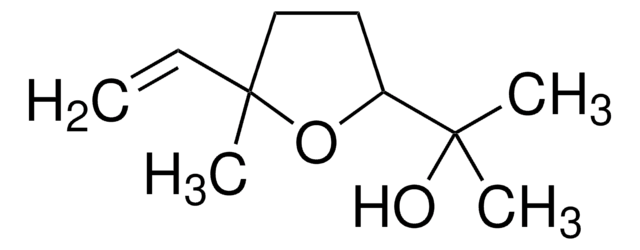W263516
L-Linalool
natural, ≥95%, FG
Synonym(s):
(−)-Linalool, (R)-(−)-3,7-Dimethyl-1,6-octadien-3-ol
About This Item
Recommended Products
grade
FG
Fragrance grade
Halal
Kosher
natural
Quality Level
Agency
follows IFRA guidelines
reg. compliance
EU Regulation 1223/2009
EU Regulation 1334/2008 & 178/2002
FDA 21 CFR 117
Assay
≥95%
optical activity
[α]20/D −19.8°, neat
greener alternative product characteristics
Less Hazardous Chemical Syntheses
Use of Renewable Feedstocks
Learn more about the Principles of Green Chemistry.
refractive index
n20/D 1.4615 (lit.)
bp
198 °C (lit.)
density
0.862 g/mL at 20 °C (lit.)
application(s)
flavors and fragrances
Documentation
see Safety & Documentation for available documents
food allergen
no known allergens
fragrance allergen
linalool
greener alternative category
Organoleptic
woody; floral
SMILES string
C\C(C)=C\CC[C@@](C)(O)C=C
InChI
1S/C10H18O/c1-5-10(4,11)8-6-7-9(2)3/h5,7,11H,1,6,8H2,2-4H3/t10-/m0/s1
InChI key
CDOSHBSSFJOMGT-JTQLQIEISA-N
Looking for similar products? Visit Product Comparison Guide
Related Categories
General description
Signal Word
Warning
Hazard Statements
Precautionary Statements
Hazard Classifications
Eye Irrit. 2 - Skin Irrit. 2 - Skin Sens. 1 - STOT SE 3
Target Organs
Respiratory system
Storage Class Code
10 - Combustible liquids
WGK
WGK 3
Flash Point(F)
166.3 °F - closed cup
Flash Point(C)
74.6 °C - closed cup
Personal Protective Equipment
Certificates of Analysis (COA)
Search for Certificates of Analysis (COA) by entering the products Lot/Batch Number. Lot and Batch Numbers can be found on a product’s label following the words ‘Lot’ or ‘Batch’.
Already Own This Product?
Find documentation for the products that you have recently purchased in the Document Library.
Customers Also Viewed
Articles
Recent regulatory changes in the US and EU have put the focus on fragrance safety and ingredient transparency, including the MoCRA, to be implemented within the next two years. Manufacturers and suppliers must comply with these changes to ensure they are meeting consumer demand and industry expectations for safety.
Recent regulatory changes in the US and EU have put the focus on fragrance safety and ingredient transparency, including the MoCRA, to be implemented within the next two years. Manufacturers and suppliers must comply with these changes to ensure they are meeting consumer demand and industry expectations for safety.
Recent regulatory changes in the US and EU have put the focus on fragrance safety and ingredient transparency, including the MoCRA, to be implemented within the next two years. Manufacturers and suppliers must comply with these changes to ensure they are meeting consumer demand and industry expectations for safety.
Recent regulatory changes in the US and EU have put the focus on fragrance safety and ingredient transparency, including the MoCRA, to be implemented within the next two years. Manufacturers and suppliers must comply with these changes to ensure they are meeting consumer demand and industry expectations for safety.
Our team of scientists has experience in all areas of research including Life Science, Material Science, Chemical Synthesis, Chromatography, Analytical and many others.
Contact Technical Service












